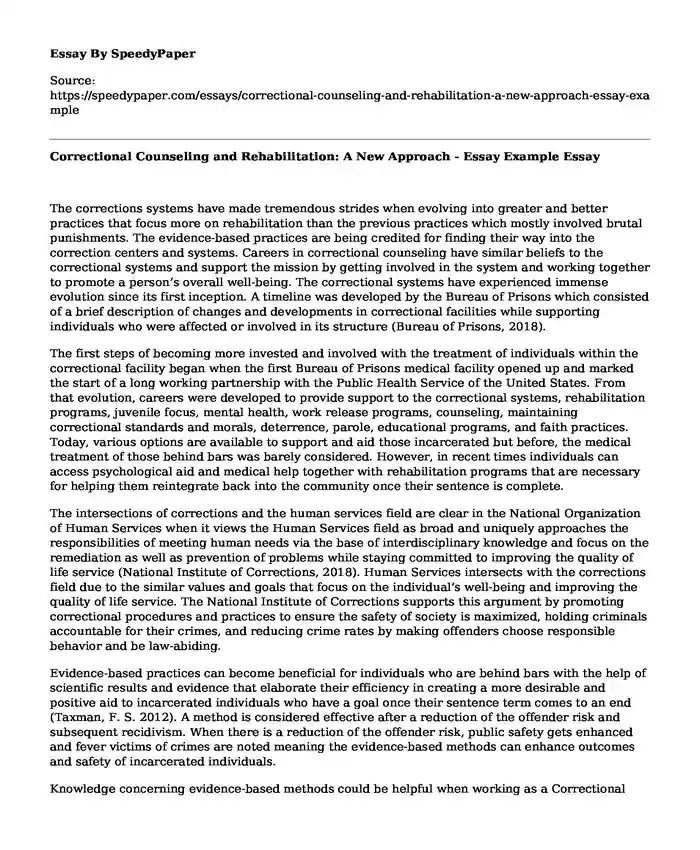
| Type of paper: | Essay |
| Categories: | Medicine Counseling |
| Pages: | 3 |
| Wordcount: | 623 words |
The corrections systems have made tremendous strides when evolving into greater and better practices that focus more on rehabilitation than the previous practices which mostly involved brutal punishments. The evidence-based practices are being credited for finding their way into the correction centers and systems. Careers in correctional counseling have similar beliefs to the correctional systems and support the mission by getting involved in the system and working together to promote a person’s overall well-being. The correctional systems have experienced immense evolution since its first inception. A timeline was developed by the Bureau of Prisons which consisted of a brief description of changes and developments in correctional facilities while supporting individuals who were affected or involved in its structure (Bureau of Prisons, 2018).
The first steps of becoming more invested and involved with the treatment of individuals within the correctional facility began when the first Bureau of Prisons medical facility opened up and marked the start of a long working partnership with the Public Health Service of the United States. From that evolution, careers were developed to provide support to the correctional systems, rehabilitation programs, juvenile focus, mental health, work release programs, counseling, maintaining correctional standards and morals, deterrence, parole, educational programs, and faith practices. Today, various options are available to support and aid those incarcerated but before, the medical treatment of those behind bars was barely considered. However, in recent times individuals can access psychological aid and medical help together with rehabilitation programs that are necessary for helping them reintegrate back into the community once their sentence is complete.
The intersections of corrections and the human services field are clear in the National Organization of Human Services when it views the Human Services field as broad and uniquely approaches the responsibilities of meeting human needs via the base of interdisciplinary knowledge and focus on the remediation as well as prevention of problems while staying committed to improving the quality of life service (National Institute of Corrections, 2018). Human Services intersects with the corrections field due to the similar values and goals that focus on the individual’s well-being and improving the quality of life service. The National Institute of Corrections supports this argument by promoting correctional procedures and practices to ensure the safety of society is maximized, holding criminals accountable for their crimes, and reducing crime rates by making offenders choose responsible behavior and be law-abiding.
Evidence-based practices can become beneficial for individuals who are behind bars with the help of scientific results and evidence that elaborate their efficiency in creating a more desirable and positive aid to incarcerated individuals who have a goal once their sentence term comes to an end (Taxman, F. S. 2012). A method is considered effective after a reduction of the offender risk and subsequent recidivism. When there is a reduction of the offender risk, public safety gets enhanced and fever victims of crimes are noted meaning the evidence-based methods can enhance outcomes and safety of incarcerated individuals.
Knowledge concerning evidence-based methods could be helpful when working as a Correctional counselor in correctional systems since the correctional counselor role assumes the responsibility to implement and develop rehabilitation plans that improve the well-being of incarcerated individuals (Sun, K 2013). Correctional Counseling involves the implementation of practices that help groups, organizations, and individuals function best through changing and assessing interpersonal and personal dysfunctions occurring in different areas.
References
Bureau of Prisons. (2018). Before looking ahead, you must look behind. Retrieved from: https://www.bop.gov/about/history/timeline.jsp
National Institute of Corrections. (2018) Mission & Goals. Retrieved from https://nicic.gov/Mission
Sun, K. (2013). Correctional counseling: A cognitive growth perspective. Burlington, MA: Jones & Bartlett Learning.
Taxman, F. S. (2012). Implementing evidence-based practices in community corrections and addiction treatment. New York, NY: Springer.
Cite this page
Correctional Counseling and Rehabilitation: A New Approach - Essay Example. (2023, Nov 08). Retrieved from https://speedypaper.net/essays/correctional-counseling-and-rehabilitation-a-new-approach-essay-example
Request Removal
If you are the original author of this essay and no longer wish to have it published on the SpeedyPaper website, please click below to request its removal:
- Essay Example on Federal Tort Claims Act Medical Malpractice
- Essay Sample on Nurse Burnout: Theoretical Foundations and Conclusions
- Essay Sample on Reducing Infections in Nursing Homes
- 5-Year Professional Plan: Healthcare Goals for Career Growth - Essay Sample
- Literary Analysis Essay on The Social Life of DNA
- Free Essay Example: Inter-Professional Working
- Paper on Unveiling Human Service Professional Practices: Shaping Success and Fostering Social Support
Popular categories




